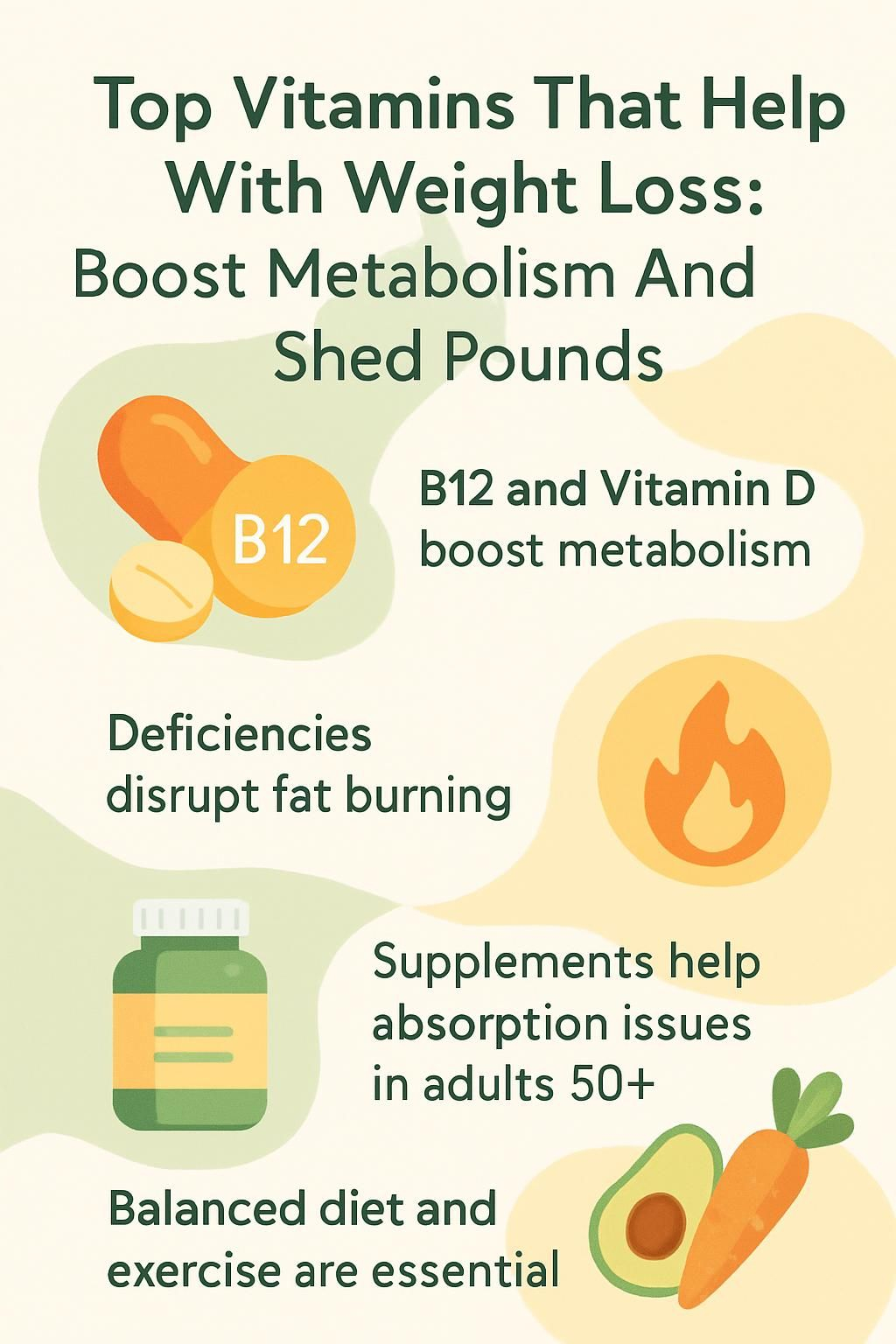Top Vitamins That Help With Weight Loss: Boost Metabolism And Shed Pounds
Our Nutrition Assistant AI Suite will transform your body. You will lose fat, get toned, and build muscle. Gain confidence and optimal health.
If weight loss has felt frustrating, you are not alone. The right vitamins for weight loss can support your metabolism, the process that turns food into energy, and help you manage hunger and energy swings. Research suggests certain vitamins and minerals affect how your body burns calories and uses fuel throughout the day.
In this guide, you will learn which essential vitamins matter, why they work, and how to add them through food or a safe supplement plan. You will also see when testing, medical guidance, or different delivery methods, like IV therapy, may help.
Use these insights to build a simple, steady plan that supports your goals.
Key Takeaways
- Evidence links B vitamins, vitamin D, vitamin C, magnesium, and zinc with healthy metabolism and weight management.
- Low levels of key micronutrients can slow fat burning, disrupt hormones, and raise the risk of obesity or metabolic problems.
- Adults over 50 and people with absorption issues sometimes need supplements, or in some cases IV therapy, to keep levels in a healthy range.
- Some options, such as chromium picolinate and green tea extract, offer modest benefits and carry risks at high doses. Speak with your healthcare provider first.
- The best results come from a balanced diet, regular exercise, and smart use of vitamins and supplements, not from pills alone.

Why are vitamins important for weight loss?

Vitamins and minerals support metabolism and hormone balance, two systems that influence weight and appetite. Except for vitamin A, which your body can store from precursors, you must get essential micronutrients from food or supplements.
Deficiencies can slow fat burning, reduce energy production, and increase the chance of weight gain. Older adults often need more because absorption can drop with age. If you eat fewer calories or avoid food groups, a quality multivitamin may help you maintain adequate intake.
Micronutrient deficiency is linked to weaker lipid metabolism, which can make steady weight loss harder.
Balanced vitamin levels also help reduce risks tied to insulin resistance, a state where cells do not respond well to insulin, and can support people with type 2 diabetes. Supplements can fill gaps when diet alone falls short, especially during active weight loss.
How do vitamins boost metabolism?
Vitamins act as helpers, called cofactors, for enzymes that turn food into energy. The B vitamin family, including B6 and vitamin B12, helps break down carbohydrates, fats, and proteins during digestion and exercise. Without enough B vitamins, you can feel sluggish, which makes workouts tougher.
Vitamin D influences hormones that control appetite and fat storage. Low vitamin D status is tied to slower metabolism and higher body fat. Magnesium supports more than 300 enzyme reactions that affect energy production and muscle function. It also helps regulate blood sugar, which can steady energy and reduce cravings.
Some blends, such as green tea extract, contain caffeine and catechins that can raise thermogenesis, the process your body uses to make heat, and increase fat oxidation in certain studies. These effects remain small without a healthy diet and regular activity, yet they can add up over time.
B Vitamins for Weight Loss
B vitamins help your body convert food into usable energy. They also support your nervous system and muscle function during exercise, two factors that matter for steady progress.
How do B Vitamins help with energy production?
Your body uses B vitamins to turn glucose from carbs, fatty acids from fats, and amino acids from protein into ATP, your cells’ main energy currency. Vitamins B6 and B12 are especially important for these steps and for normal red blood cell function, which carries oxygen to working muscles.
Healthy B vitamin status supports daylong energy and may reduce fatigue during exercise or calorie cuts. People with adequate levels usually find it easier to keep up with training, which helps maintain muscle and burn more calories.
What foods are rich in B Vitamins?
You can cover most B vitamins through a varied plate. Try mixing the options below across your week.
- Meat, poultry, eggs, and dairy are major sources of B12, riboflavin, and niacin that support energy production.
- Leafy greens such as spinach and kale supply folate, also called B9, which helps your body process fats and proteins.
- Whole grains, including brown rice, oats, barley, and fortified cereals, offer thiamin, niacin, and B6 to aid fat burning.
- Nuts and seeds contain biotin, or B7. Sunflower seeds and almonds add helpful fats and vitamin E as well.
- Legumes such as chickpeas, lentils, and beans deliver several B vitamins and fiber that supports fullness.
- Fish like salmon and tuna provide B12 and niacin. Oily fish also support heart health.
- Plant-based eaters should use fortified plant milks or a B12 supplement, since B12 is found mainly in animal foods.
- B vitamins are water soluble and sensitive to heat. Gentle cooking helps preserve them.
Eating from each group makes it easier to meet daily needs without a complex plan.
Should you take B Complex supplements for weight loss?
Most people can meet their needs with a balanced diet. Since B vitamins are water soluble, your body does not store large amounts, so you need steady intake. People with gut conditions, such as celiac disease or Crohn’s disease, may not absorb B vitamins well. In that case, supplements can help restore healthy blood levels.
If a true deficiency is present, correcting it, for example with vitamin B12, can improve energy and motivation for activity. For severe absorption problems, some clinicians use IV B complex. Even so, research does not show clear fat loss from B vitamins alone unless a deficiency is involved.
Speak with a healthcare provider before starting a B complex. This is especially important if you take medications or have ongoing health concerns.
Vitamin D for Weight Loss
Vitamin D plays roles in hormone function, muscle health, and fat metabolism. Several studies suggest that improving low vitamin D may support weight loss efforts when combined with diet and exercise.
How does Vitamin D support metabolism?
Vitamin D affects adipose tissue, which is body fat. It helps guide how fat cells form and store energy. It also improves insulin sensitivity, so your body can move sugar from the blood into cells more efficiently. That can help control appetite and cravings.
Stronger muscles need vitamin D for repair and function. Since muscle burns more calories than fat at rest, good vitamin D status can support your daily calorie burn. People with healthier vitamin D levels often have smaller waist measurements than those who are deficient.[1]
If you spend most of your time indoors or live at northern latitudes with limited winter sun, ask your clinician if testing and vitamin D supplementation fit your plan.
What are the best sources of Vitamin D?
You can raise vitamin D through food, sunlight, or a supplement. Mix several of the options below.
- Fatty fish such as salmon, mackerel, and sardines provide generous amounts. Eating fish two to three times per week helps many people meet goals.
- Egg yolks offer vitamin D, protein, and healthy fats. One large egg has about 40 IU.
- Beef liver supplies modest vitamin D and also contains iron and zinc.
- Mushrooms exposed to sunlight or UV light contain vitamin D2, a helpful option for plant-based diets.
- Fortified foods, for example milk, breakfast cereals, and orange juice, often supply around 100 IU per cup in the United States.
- Cheese contributes small amounts, which still add up as part of a varied diet.
- Sunlight triggers vitamin D production in the skin. About 10 to 30 minutes, several times per week, can be enough depending on season and skin tone.
- Supplements can fill gaps. Check dosage carefully and test blood levels if you use vitamin D long term.
Pair these sources with routine movement for the best metabolic support.
Can Vitamin D supplements aid weight loss?
Studies suggest vitamin D supplementation may help if you are deficient. People with a higher BMI often show lower blood levels, and vitamin D is fat soluble, which means it can get stored in fat tissue. That storage can limit how much reaches active tissues.
Oral supplements are common and effective for many people. In cases of poor absorption or very low levels, clinicians sometimes use IV vitamin D under medical supervision. Testing first helps guide the right approach and avoids excess intake.
Many people notice better energy and mood after correcting a deficiency, which can support consistent exercise and meal planning.
Vitamin C and Weight Management
Vitamin C supports fat metabolism and exercise performance. People with adequate levels tend to burn more fat during physical activity than those who are low.
How does Vitamin C help with fat burning?
Vitamin C supports carnitine production. Carnitine helps move fatty acids into cell structures, called mitochondria, where they are burned for energy. Low vitamin C status can reduce fat oxidation during workouts. Some research shows people with a higher BMI may need more vitamin C to reach similar blood levels.
Vitamin C also supports serotonin production, which can affect appetite and mood. As an antioxidant, it helps limit oxidative stress, a process that can interfere with healthy metabolism.
For example, adding citrus fruit and bell peppers to your daily meals can raise intake quickly, and many people report better energy during cardio sessions.
Which foods provide Vitamin C?
Vitamin C is heat sensitive, so raw options often deliver more. Try these foods often.
- Citrus fruits such as oranges provide about 70 mg per medium fruit.
- Strawberries offer around 85 mg per cup, plus fiber to support blood sugar control.
- Bell peppers contain up to 95 mg in half a cup, making them one of the richest sources.
- Spinach adds vitamin C along with magnesium and other minerals that support overall health.
- Tomatoes supply roughly 20 mg per medium fruit. Raw slices keep more vitamin C than cooked sauces.
- Broccoli has about 51 mg per half cup when raw and supports heart health.
- Brussels sprouts provide about 48 mg per half cup and add fiber for gut health.
- Potatoes contain around 17 mg per medium potato. Eating the skin boosts mineral intake.
- Fortified juices vary, so check labels to confirm vitamin C content.
- Choose raw snacks or salads often, since cooking lowers vitamin C.
Mixing these options during the week keeps your intake steady and supports everyday metabolism.
Is Vitamin C supplementation beneficial for weight loss?
If your diet is low in fruits and vegetables, a modest vitamin C supplement can help. People with a higher BMI often show reduced vitamin C status. Vitamin C supports fat use during activity and may help reduce oxidative stress that slows progress.
Gut disorders, such as Crohn’s disease or ulcerative colitis, can impair absorption. In more severe cases, a clinician may recommend IV vitamin C so the nutrient reaches your bloodstream directly. For most people, food first is still the best approach.
Discuss a safe dose with your healthcare provider, especially if you take other medications or weight management supplements.
Magnesium for Weight Loss
Magnesium helps your cells make energy and supports blood sugar control, sleep quality, and muscle function. These factors make staying active and managing appetite easier.
What role does magnesium play in energy production?
Magnesium activates enzymes that turn carbohydrates, proteins, and fats into ATP, the body’s main energy molecule. Low magnesium can lead to fatigue and weaker workout performance.
It also helps muscles contract and relax and supports fluid balance, known as electrolyte regulation. Better blood sugar control and steady energy make it easier to follow a plan and avoid cravings.
Many people notice improved sleep and stamina once they meet daily needs through food or a supplement plan discussed with a clinician.
Citation: Rosanoff A et al. Magnesium Deficiency: Health Risks Across the Lifespan. Adv Nutr. 2021;12(3):778-779.
What foods are high in magnesium?
Plenty of common foods contain magnesium. Build meals that layer these sources.
- Broccoli and Brussels sprouts add magnesium and fiber.
- Legumes such as black beans, chickpeas, and lentils provide protein and magnesium.
- Pumpkin seeds are excellent, with over 150 mg per ounce.
- Whole grain bread supplies magnesium and fiber. Two slices can deliver up to 46 mg.
- Milk offers a moderate amount, along with calcium and vitamin D.
- Fatty fish like salmon and mackerel contribute magnesium plus other key nutrients.
- Some antacids and electrolyte products contain magnesium. Use only as directed by a clinician.
Combining several sources across the day helps you meet daily magnesium needs without large doses.
Should you consider magnesium supplements?
If lab testing shows low magnesium, supplements can help. People with obesity, diabetes, or high blood pressure often have lower levels. Magnesium citrate or aspartate is common for better absorption.
The NIH recommends limiting supplemental magnesium to 350 mg per day for adults, unless your clinician advises otherwise. Higher amounts can cause diarrhea, nausea, or cramps. Very high doses can be dangerous for the heart.
Individuals with absorption problems, such as celiac disease, may need IV magnesium under medical care. Talk with your healthcare provider before starting any new product so it fits safely with your plan.
Zinc for Weight Loss
Zinc supports thyroid hormones and insulin, both of which influence metabolism and appetite. Adequate zinc helps your body use fuel more efficiently.
How does zinc affect thyroid and hormone health?
Your thyroid needs zinc to make hormones that set your metabolic pace. Low zinc can reduce thyroid hormone production and slow calorie burn. Zinc also helps the pancreas release insulin, which aids blood sugar control and can reduce cravings.
Maintaining healthy zinc status supports hormone balance and immune function. People with low zinc may notice poor wound healing or fatigue alongside changes in weight or appetite.
What are good dietary sources of zinc?
Both animal and plant foods supply zinc, although plant compounds called phytates can limit absorption.
- Oysters are the richest source, with about 74 mg in 3 ounces.
- Beef provides around 7 mg in a 3-ounce serving.
- Crab and shrimp offer about 3 to 6 mg per serving.
- Pork and turkey supply roughly 2 to 5 mg per serving.
- Cheese contributes smaller amounts, usually under 1 mg per ounce.
- Pumpkin seeds provide about 2 to 3 mg per quarter cup, a helpful option for plant-based eaters.
- Lentils and fortified cereals add zinc, though absorption is lower due to phytates.
- Peanuts and rice contain about 1 to 2 mg per serving and can help you reach daily targets.
If you follow a vegan pattern, consider a zinc supplement or choose fortified foods to offset lower absorption from plants.
When should you use zinc supplements?
Use zinc supplements if your diet is low in zinc or if testing shows a deficiency. People with conditions that reduce absorption, such as inflammatory bowel disease or heavy alcohol use, may need medical guidance or, in some cases, IV zinc.
During pregnancy and breastfeeding, zinc needs rise by about 2 to 5 mg per day. Because zinc affects thyroid function and insulin, keeping levels in range supports steady metabolism and appetite control.
Start with food first. Add a supplement if you cannot meet needs through meals.
Other Key Supplements for Weight Loss
Some supplements offer small advantages alongside a balanced diet and active routine. Evidence is mixed, so manage expectations and use safe doses.
Chromium Picolinate
Chromium picolinate may help regulate blood sugar and reduce cravings for sweets. Weight loss effects are modest, about 3 to 6 pounds in some studies, and not consistent across trials. Several studies show no difference from a placebo.
High doses can cause stomach pain, bloating, muscle cramps, or kidney and liver problems. If you try chromium, follow label directions and review medications with your clinician.
Green Tea Extract
Green tea extract contains caffeine and catechins that can raise calorie burn at rest and increase fat oxidation in some research. The effect is small but may help as part of a complete plan.
Large doses have been linked with liver injury in rare cases. Use only the recommended dose and stop if you notice nausea, jaundice, or abdominal pain.
Conjugated Linoleic Acid (CLA)
CLA is a fatty acid found in dairy and beef. Supplemental CLA may modestly reduce body fat while helping preserve lean muscle during calorie cuts. Studies suggest small benefits over 6 to 12 months when you also train and follow a healthy diet.
Check quality and dose, and monitor how you feel. Results vary between people.
Glucomannan
Glucomannan is a soluble fiber from the konjac root. It absorbs water and expands in the stomach, which can increase fullness and reduce calorie intake. Doses of 1 to 3 grams before meals have shown modest benefits in some studies.
Drink plenty of water with each dose. Rarely, taking it without enough fluid can cause choking or blockages. Gas or bloating can occur in sensitive people.
Combining Vitamins with a Healthy Lifestyle
Vitamins and supplements work best when the foundation is strong. A steady routine turns small gains into real progress.
Why is a balanced diet important for weight loss?
A balanced diet supplies the vitamins and minerals your body needs to run metabolism efficiently. Fill your plate with leafy greens, colorful fruits such as oranges and berries, nuts and seeds, lean proteins, and whole grains. These foods support energy and keep you full, which helps you stick to your plan.
Food should be your main source of nutrients. Use supplements to fill gaps or correct low levels. Adequate protein and fiber help protect muscle and support fat loss, which is a key goal for healthy weight management.
How does regular exercise boost metabolism?
Exercise raises your heart rate and burns calories. Over time, it helps you build or maintain muscle, and muscle tissue burns more calories at rest than fat tissue. Cardio sessions increase daily energy burn, and strength training protects lean mass during a calorie deficit.
Even short walks or quick bodyweight sessions add up. Pair movement with a smart meal plan and safe supplements for weight loss to see steady change.
Considerations for Using Vitamins and Supplements
Supplements can help, but more is not better. Choose products with clear labels from reputable brands, and add them step by step.
When should you consult a healthcare provider?
Speak with a healthcare provider before starting new vitamins or a weight loss supplement, especially if you take prescription drugs, have a chronic condition, or are pregnant or breastfeeding. Professional guidance is important for people with diabetes, high blood pressure, kidney or liver disease, or gut conditions that affect absorption.
Ask about testing for vitamin D, B12, iron, magnesium, and zinc if you have fatigue, hair changes, brittle nails, cramps, or frequent infections. Proper testing helps you target the real problem and avoid guesswork.
What are the risks of taking too many supplements?
High doses can cause side effects. Too much of certain vitamins or minerals may lead to appetite loss, nausea, vomiting, stomach pain, or changes in heart rhythm. Excess magnesium can cause diarrhea and cramps, and in extreme cases may harm the heart.
Green tea extract at very large doses has been linked with liver damage. High chromium intake can harm the kidneys or liver. Always read labels, track your total intake across products, and avoid stacking multiple items with the same ingredient.
Conclusion
The right mix of nutrients can support weight loss by fueling metabolism, balancing hormones, and improving energy. Focus on essential vitamins such as the B vitamin family, vitamin D, vitamin C, magnesium, and zinc. A balanced diet should do most of the work, while thoughtful vitamin supplements can help fill gaps.
Combine nutrient-rich meals with regular exercise and consistent sleep. If you are unsure about your levels, ask your healthcare provider about testing and a safe plan. With steady habits and smart use of vitamins and supplements, you can boost metabolism and move closer to a healthy weight.
FAQs
1. Why are vitamins important for weight management?
Vitamins are important because they help the body use energy, support metabolism, and keep organs working well. Without enough vitamins, it is harder to lose weight or stay healthy.
2. How does vitamin B12 help with weight loss?
Vitamin B12 is essential for turning food into energy and supporting a healthy nervous system. People who do not get enough vitamin B12 may feel tired and have trouble losing weight since their bodies cannot burn calories as fast.
3. Which other vitamins play a role in boosting metabolism?
Several vitamins are important when it comes to weight control. Vitamin D helps regulate fat storage; vitamin C supports fat breakdown; and the group of B vitamins, including B6 and folate, work together to convert food into usable energy.
4. Can taking more vitamins alone lead to shedding pounds?
Taking extra vitamins will not cause you to lose pounds unless your body lacks them in the first place. Eating balanced meals that include all needed nutrients works best for health and steady progress toward a healthy weight goal.
Summary: Vitamins such as vitamin B12 are essential when it comes to using energy efficiently during weight loss efforts. While these nutrients support metabolism, they work best alongside good eating habits rather than on their own.







